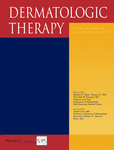Clinical predictors of nonresponse to anti-TNF-α agents in psoriatic patients: A retrospective study
Clara De Simone and Giacomo Caldarola contributed equally to this article.
Abstract
Although the heterogeneity of the therapeutic response to TNF-α blockers seems to be mainly due to genetic factors, several studies showed that a range of factors may influence it. The aim of our study was to investigate the impact of patients' demographic and clinical characteristics on primary response to an anti-TNF-α therapy in psoriatic patients. We retrospectively examined the relationship between various clinical and demographic features and response to treatment with etanercept, adalimumab, and infliximab, evaluated as PASI75 and average PASI improvement at weeks 12, 16, and 14, respectively. We analyzed data obtained from 199 patients. A better response to the treatment was significantly associated with male gender (OR = 2.59), coexistence of psoriatic arthritis (OR = 1.97), and PASI ≤15 at baseline (OR = 0.91). The present study supports that some clinical factors may be potential predictors of response to anti-TNF-α agents in psoriatic patients.




